What are helping verbs? Verbs are action words, that is, they describe an action, motion, or activity. There are two primary types of verbs: main verbs and helping verbs. Helping verbs are also known as auxiliary verbs.
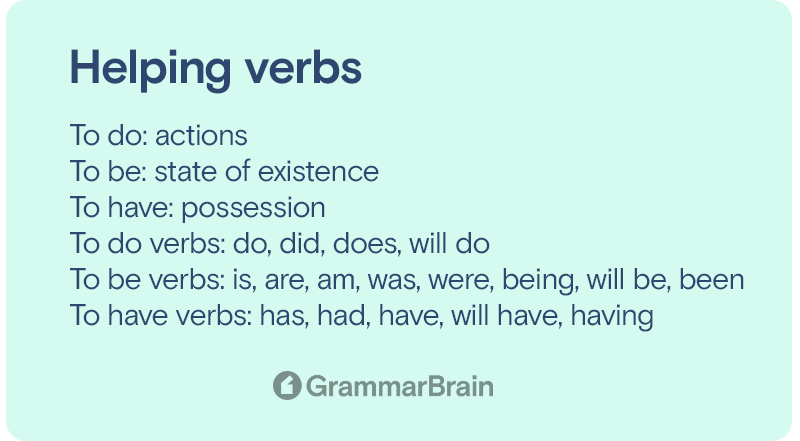
What are helping verbs?
Helping verbs are verbs that refer to a main verb’s tense, voice, or mood. We can classify helping verbs as follows:
- To do: actions
- To be: state of existence
- To have: possession
- To do verbs: do, did, does, will do
- To be verbs: is, are, am, was, were, being, will be, been
- To have verbs: has, had, have, will have, having
Definition
A verb (as have, be, many, do, etc.), that is used to with another verb and expresses things as person, number, mood, or tense.
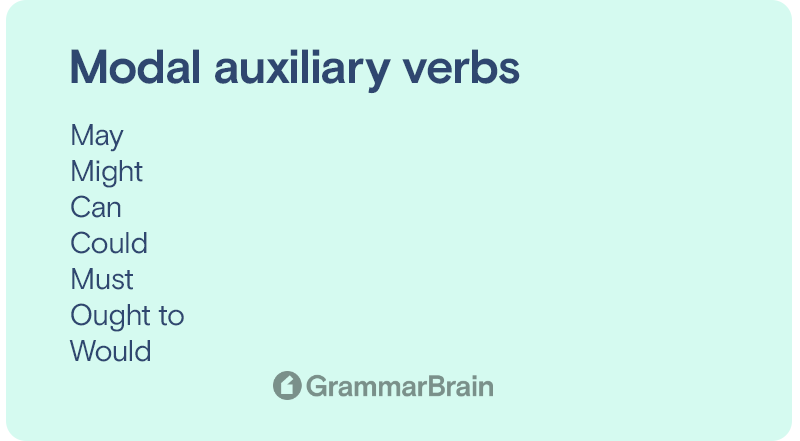
Modal auxiliary verbs
Apart from the do, be, and have verbs, another class of helping verbs are called modal auxiliary verbs. Unlike do, be, and have verbs, modal auxiliary verbs never change their form. The following are the modal auxiliary verbs:
Helping verbs play an important role in the English language since we can’t form full-length, grammatically accurate sentences without using them.
Let’s go through examples of how helping verbs determine the nature of main verbs in sentences.
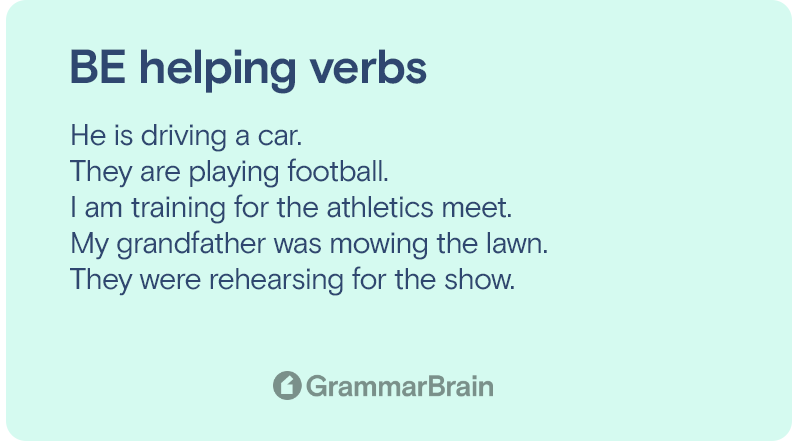
Be verbs (is, are, am, was, were, being, will be, been)
Be verbs determine the state of the main verb and also specify its tense. These verbs also tell us whether a noun is singular or plural. Here are some examples:
- He is driving a car.
- They are playing football.
- I am training for the athletics meet.
- My grandfather was mowing the lawn.
- They were rehearsing for the show.
- History is being created at this very moment.
- They will be working for two more hours.
- I have been doing this for a long time.
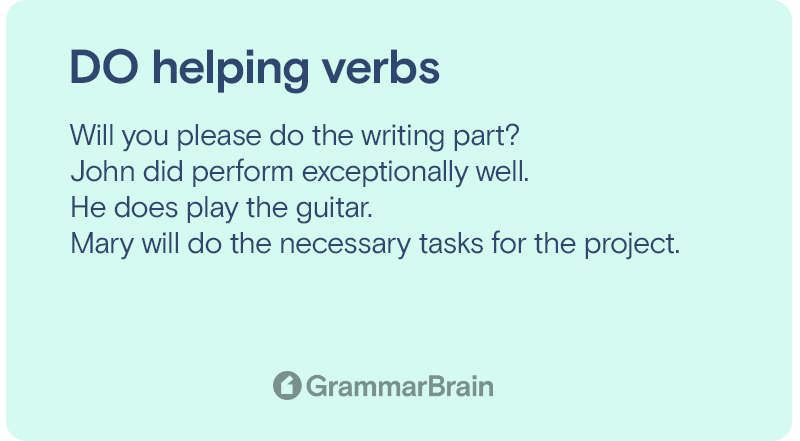
Do verbs (do, did, does, will do)
- Will you please do the writing part?
- John did perform exceptionally well.
- He does play the guitar.
- Mary will do the necessary tasks for the project.
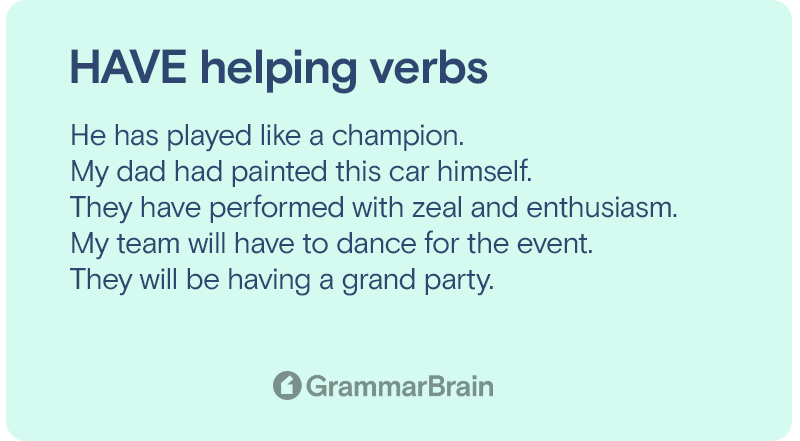
Have verbs (has, had, have, will have, having)
- He has played like a champion.
- My dad had painted this car himself.
- They have performed with zeal and enthusiasm.
- My team will have to dance for the event.
- They will be having a grand party.
Modal auxiliary verbs (may, might, can, could, must, ought to, shall, should, will, would)
- The cat may start running at any moment.
- Brazil might win the next football world cup.
- She can dance like a pro.
- A few years ago, Mary could bake five cakes at once.
- I must perform well in the exam.
- He ought to rectify his mistakes.
- I shall share the details with you.
- My friend should run every morning.
- John will jump in excitement upon hearing this news.
- He would go to great lengths to ensure success.
From the above examples, we can get an idea of the role of helping verbs in sentence construction. Let’s dissect a few of these sentences to see how helping verbs affect the main verb, noun, and the overall meaning of the sentences.
Helping verbs specify tense
The tense of a sentence tells us when an event is taking place – in the present, past, or future. Helping verbs specify the tense of a sentence. Have a look at the following examples:
- He is going to school. (Present)
- John will go to school next year. (Future)
- They were going to fight us. (Past)
Helping verbs also specify which verbs are in simple tense and which verbs are in perfect tense. Perfect tenses refer to ongoing events, in the past, present, or future.
- He has practiced his bit many times. (Present perfect)
- They have played the game all their lives. (Past perfect)
- At 9’0 clock, I will have left home. (Future perfect)
- Mary has been doing this for years. (Present perfect continuous)
- John had been trying to get a job (Past perfect continuous)
- Next Christmas, I will have done this for 20 years. (Future perfect continuous)
As we can see from these examples, helping verbs are the key to identifying the tense of a sentence. But that’s not all. Helping verbs also determine the voice of a sentence (active or passive).
Helping verbs and voice
In active voice, the subject of a sentence performs the action. The action’s target is the primary consideration in the passive voice, and the verb affects the subject.
Have a look at the following examples to see how we can modify the voice of a sentence with helping verbs:
- I ate an apple (Active)
- The apple was eaten by me (Passive)
- She disconnected the call (Active)
- The call was disconnected by her (Passive)
- They will play a game at 7 PM (Active)
- A game will be played by them at 7 PM (Passive)
- (Someone) stole my books (Active)
- My books were stolen (Passive)
Passive voice is typically used in more formal scenarios, while we use the active voice (in most cases) in everyday speech and writing.
Helping verbs and mood
We use helping verbs to change the mood of sentences. Interrogative, negative, imperative, etc. are some of the types of sentences used in English. Helping verbs determine the nature of a sentence depending on how we use them. Consider the following examples:
- Did he go to the store? (Interrogative)
- Don’t do this until I ask you to. (Imperative)
- The moon is shining brightly tonight (Indicative)
- I wish I were in your place (Subjunctive)
How we use helping verbs and where we place them in a sentence decides the mood of the sentence.
Modal auxiliary verbs
Modal auxiliary verbs express one of the following ideas:
- Necessity
- Possibility
- Intention
- Ability
Here are some examples:
- May I go to the toilet? (Intention)
- You must hold on to this. (necessity)
- I can’t pass this test. (ability)
- A failure can’t decide your future (possibility)
Examples of can/could
- They can visit the park.
- He can solve this problem.
- They could not attend the birthday bash.
- John could not ride his horse.
- Could I lend your bike, please?
- Can I go to the beach?
Examples of may/might
- He might get an opportunity.
- I may go to Chicago today.
- They may reach Chicago on Saturday.
Examples of must
- She must pay the examination fee.
- He must take a break.
- They must have breakfast every morning before leaving the house.
- Either Joseph or she must leave now.
Examples of will
- He will go to the shopping mall in the afternoon.
- They will go to the shop in the evening.
- He will go to the shopping mall in the afternoon.
- I will go to the shopping mall in the evening.
Examples of would
- She would purchase a PC for you.
- Bryan hoped that she would get good scores in her final exam.
- Would you like to have coffee?
Examples of shall
- Shall we go to the mall today evening?
- They shall work five days a week.
- We shall go to the beach in the afternoon.
Examples of should
- He should wear a helmet while riding the bike.
- You should work diligently.
- Borris should keep his promise.
- They should attend all the classes sincerely.
Examples of ought
- They ought to be kind.
- She ought to obey her parents.
- They ought to help the downtrodden.
- She ought to go to his friend sometimes.
- Sheila ought to be kind.
Verb phrases
Verb phrases comprise a helping verb with the main verb. For example:
- They have been dancing for more than an hour.
- John was studying.
- It would have been a great idea if implemented properly.
- I will have completed the work by now if only I could focus.
Helping verbs vs. regular verbs
Regular verbs adhere to the standard rule of forming their past participle and simple past tense. The “usual” rule in the English language is to incorporate “-d” or “-ed” at the end of the verb’s base form for creating past forms.
On the other hand, the function of a helping verb is to indicate at what time the action took place.
Helping verbs vs. action verbs
Helping verbs are also referred to as auxiliary verbs and are used along with the main verb in a sentence to represent the mood, voice, or tense of the main verb.
Some examples of the main helping verbs are as follows:
- To do
- To have
- To be
These words appear in the following manner in sentences:
- To Do: will do, did, do, does
- To Have: have, has, having, had, will have
- To Be: is, am was, are, being, were. Will be, been
On the other hand, action verbs, as the name indicates, are used to represent what action the subject does in a sentence. Simply put, their function in a sentence is to indicate a subject’s action.
Examples:
- My dad reached the office at 9:00 am.
- He wrote an application to the manager asking for a new checkbook.
- Mary is singing a melodious song to entertain her guests.
FAQs
1. What are helping verbs?
Helping verbs (or auxiliary verbs) describe the state, mood, voice, or tense of the main verb and/or noun.
2. What are the types of helping verbs?
There are four types of helping verbs:
- Be verbs: is, are, am, was, were, being, will be, been
- Have verbs: has, have, will have, had, having
- Do verbs: do, did, does, will do
- Modal auxiliary: can, could, might, may, must, ought, should, shall, would
3. What are the functions of helping verbs?
Helping verbs determine:
- The tense of a sentence.
- The voice of a sentence.
- The mood of a sentence.
4. How to separate the helping verb and the main verb?
Sometimes, a word like “not” can separate the main and helping verb. For instance, look at the sentence below”
Sheila does not wish to buy a new bike.
Here, “not” is the negative particle, which comes between the main verb “wish” and the helping verb “does.”
Sources:
- Helping Verbs: Explanation and Examples (grammar-monster.com)
- Mood: Explanation and Examples (grammar-monster.com)
- Helping Verbs in English – How it Is Used with Examples (byjus.com)
- BEING: use of BEING as a main verb and a helping verb | 5 unique sages (englishwithashish.com)
- Helping Verbs: Examples of Helping Verbs – The Blue Book of Grammar and Punctuation (grammarbook.com)
Inside this article
Fact checked:
Content is rigorously reviewed by a team of qualified and experienced fact checkers. Fact checkers review articles for factual accuracy, relevance, and timeliness. Learn more.
Core lessons
Glossary
- Abstract Noun
- Accusative Case
- Anecdote
- Antonym
- Active Sentence
- Adverb
- Adjective
- Allegory
- Alliteration
- Adjective Clause
- Adjective Phrase
- Ampersand
- Anastrophe
- Adverbial Clause
- Appositive Phrase
- Clause
- Compound Adjective
- Complex Sentence
- Compound Words
- Compound Predicate
- Common Noun
- Comparative Adjective
- Comparative and Superlative
- Compound Noun
- Compound Subject
- Compound Sentence
- Copular Verb
- Collective Noun
- Colloquialism
- Conciseness
- Consonance
- Conditional
- Concrete Noun
- Conjunction
- Conjugation
- Conditional Sentence
- Comma Splice
- Correlative Conjunction
- Coordinating Conjunction
- Coordinate Adjective
- Cumulative Adjective
- Dative Case
- Determiner
- Declarative Sentence
- Declarative Statement
- Direct Object Pronoun
- Direct Object
- Diction
- Diphthong
- Dangling Modifier
- Demonstrative Pronoun
- Demonstrative Adjective
- Direct Characterization
- Definite Article
- Doublespeak
- False Dilemma Fallacy
- Future Perfect Progressive
- Future Simple
- Future Perfect Continuous
- Future Perfect
- First Conditional
- Irregular Adjective
- Irregular Verb
- Imperative Sentence
- Indefinite Article
- Intransitive Verb
- Introductory Phrase
- Indefinite Pronoun
- Indirect Characterization
- Interrogative Sentence
- Intensive Pronoun
- Inanimate Object
- Indefinite Tense
- Infinitive Phrase
- Interjection
- Intensifier
- Infinitive
- Indicative Mood
- Participle
- Parallelism
- Prepositional Phrase
- Past Simple Tense
- Past Continuous Tense
- Past Perfect Tense
- Past Progressive Tense
- Present Simple Tense
- Present Perfect Tense
- Personal Pronoun
- Personification
- Persuasive Writing
- Parallel Structure
- Phrasal Verb
- Predicate Adjective
- Predicate Nominative
- Phonetic Language
- Plural Noun
- Punctuation
- Punctuation Marks
- Preposition
- Preposition of Place
- Parts of Speech
- Possessive Adjective
- Possessive Determiner
- Possessive Case
- Possessive Noun
- Proper Adjective
- Proper Noun
- Present Participle
- Prefix
- Predicate



